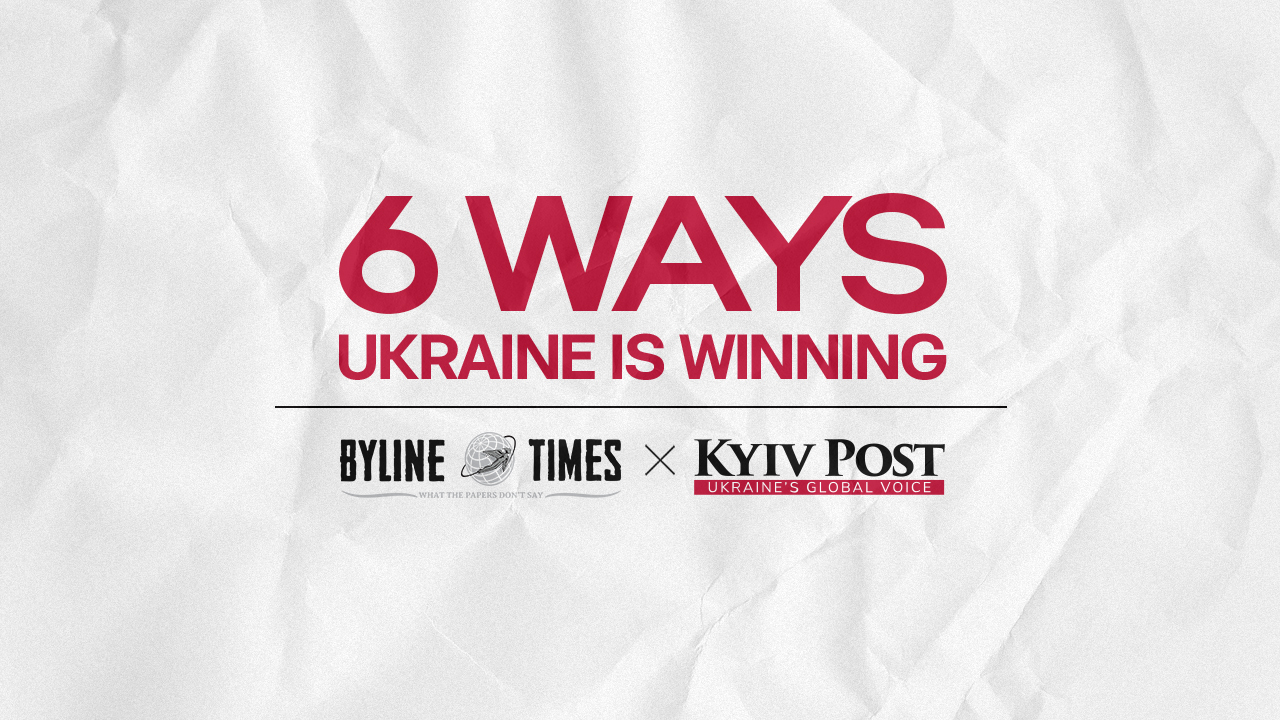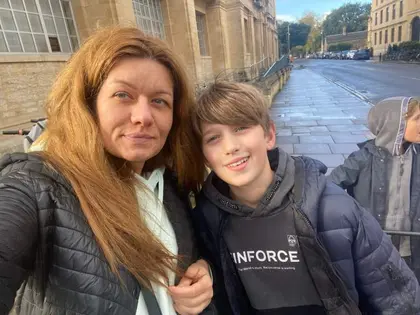'Six Ways Ukraine is Winning' is a collaboration between Kyiv Post and Byline Times, highlighting Ukrainian ingenuity, resilience and determination in the face of one year of Russia's full-scale invasion.
“We thought to ourselves: we can sit here and get really upset about what we are seeing on the news,” explains Sean. “Or we can do something about it. We’re not politicians. We’re not diplomats. We’re not soldiers. But we didn’t want to sit here and feel helpless. We wanted to do something”.
JOIN US ON TELEGRAM
Follow our coverage of the war on the @Kyivpost_official.
For Sean and Shahidul, that ‘something’ was opening their home to Dymtro, a Business Studies student from Ukraine.
It’s now a year since Putin’s forces invaded Ukraine, and seven years since the 2014 invasion of Crimea. When Russia’s tanks first crossed the border and missiles rained on historic cities, Putin boasted he could get his war finished in three days. Now, 365 days later, the war has left thousands dead and millions displaced, with 162,700 Ukrainian refugees coming to the UK.
The majority of those arriving are, like Dymtro, on the Homes for Ukraine scheme: a Government initiative set up to match U.K. hosts with people fleeing the war. Dymtro, Sean and Shahidul met via the Reset U.K. Charity, and the three have been living together since the summer when Dymtro arrived just before his birthday.
 Dymtro, Shahidul and Sean
Dymtro, Shahidul and Sean
“It was my birthday and it was so crazy because I don’t know this country, I don’t know how things worked,” Dymtro tells Byline Times, recalling his arrival.
“I always celebrated with family and friends. But now here I was, with two strangers. They are not strangers anymore”.
There was cake to celebrate his birthday and from the very beginning, Dymtro says, he was “very welcomed. And that is worth a lot when you just left your country, you left your family, you left everything. To feel safe and comfortable and welcomed”.
Iryna’s arrival to the U.K. from Lviv also coincided with a special occasion: this time, Christmas. Having remained in Ukraine, where she worked in a specialist cheese retailer, for the first months of the war, she made the painful choice to leave. “It was not an easy decision,” she tells Byline Times.
“Because it changed everything. I don’t have friends here, or the language, or work. But in Ukraine it was really hard. We don’t have light [electricity] for most of the day. Sometimes just two or three hours”.
Reset U.K. matched Iryna with Molli and Jamie, a young couple who had recently bought their first home.
“We have a spare room,” says Jamie. “We are in the position where we can help someone. We felt like if the shoe was on the other foot, would we want someone to do the same for us? That’s the approach we took”.

Iryna joined Molli’s and Jamie’s family for Christmas. “It was so nice, there were so many presents and everyone was playing board games, even the older people. We don’t really do that in Ukraine”.
Seven months earlier, and Yulia also came to the U.K. from Lviv. She and her son Maks made the “awful” journey from Ukraine shortly after the war began. It was not easy. With so many frightened people crowding onto trains, fleeing the bombs and invading forces, she was forced to stand the whole way to Poland.
“We’ve never been to the U.K. before, so the decision was made quite spontaneous based on the desire to be safe,” Yulia shares with Byline Times. “When we arrived I had no idea how to start. Maks had a panic because of uncertainty and was missing his father. I had a broken arm and was absolutely devastated”.
The pair were hosted by Tina and Nick. “They opened not only their home but their hearts,” she says. “They always treated us as a part of the family and that massive support gave us power to move on”.
Yulia, Iryna and Dymtro are all working, with their hosts supporting them to find a job and helping with their CV.
“The guys have been very, very helpful to me,” says Dymtro. “They helped me to improve my CV, they helped me with everything that is here. And it’s so good to feel welcomed, when you find such hard circumstances”.
Starting his new job gave Dymtro the opportunity, too, to show his thanks to Sean and Shahidul for their kindness and friendship. He treated them to dinner at a local Ukrainian restaurant. “It was an incredibly kind and generous thing to do,” says Sean.
“He’s working, he’s studying, he’s learning English, he’s a superman all round,” adds Shahidul.
Like many people who signed up to the scheme, Sean and Shahidul were expecting to host a woman – the majority of those fleeing the war are women and young mothers in particular.
“When Dymtro asked to be matched with us, we had to challenge ourselves about having a young man come to stay, as there are a lot of misconceptions about whether young men are allowed to leave Ukraine or not,” explains Shahidul.
“And we had a lot of conversations about it and realised that, as a young man leaving Ukraine, Dymtro is quite marginalised by most people.
And that it was going to be harder for him to be matched than it would be for some other people, and so we felt we definitely needed to give him the opportunity to come here”. “Ukraine does not want its young men to fight in the war,” Sean adds.
“It’s not Russia, it’s a country that has moral and ethical and democratic principles, and it wants its young people to get an education and pursue their studies so they can go back and rebuild the country”.
Olesya fled the fighting at the start of the war. The family lived near the border with Belarus where, she says “the situation is not good, to put it mildly”.
She left with her children on 19 March, travelling across the border into Bucharest, Romania and from there to the UK. “It’s scary to think what will happen next when you don’t have any idea what will happen,”
Olesya tells Byline Times. “When you have planned your whole life, you know what you are doing next weekend, you have planned your vacation for the summer, you know that you will celebrate your birthday with friends in a cafe… It’s scary to not know what’s coming.
Then we came to the U.K. on 23 April and I met Catherine and I knew I am not alone in this country”.

Olesya and her son
The first days in the U.K. felt like a daze. She missed her home, her husband, the children missed their father. “It is difficult to say about first impressions since I was in a shell,” she explains.
“I walked the streets without looking at them, I understood that I’m in England because the people speak a different language”. Catherine and her family helped Olesya and her sons to settle into their new life.
The family had a house to themselves – the hosts usually rented out the property but decided to sign up to the Homes for Ukraine scheme instead. “They were always here to help,” Olesya says.
“Whether it was helping the children get into school, make an appointment with the doctor, have lunch together… I know if I just turn to them they will do everything in their power”. Yulia also commented on how her hosts helped Maks settle into school.
“We actually came with no personal belongings, no money and no plans on how to start. So they took care of all these things, helped to arrange school for Maks, applied for all documents,” she explains to Byline Times.
“Tina and Nick spend a lot of time with Maks. Teaching him to cook and supported him with English”.
“I can say one thing: the people here are very friendly and kind,” Olesya says.
It’s a sentiment that all shared. “Whenever there was a need for something, the community was willing to help,” says Yulia.
“I was amazed with the respectful attitude to people and how English people respect their traditions and family”.
That kindness struck Iryna too. “Here people say hello, how are you,” she tells Byline Times. The three enjoy going to the pub together and hanging out. “It’s like having a flatmate,” says Molli.
“It’s been interesting learning about Ukraine and about another culture and country”.
“Dymtro is a very independent, motivated, but also extremely kind, young man and, and it didn’t feel like he was a stranger for very long at all,” says Sean. “He feels like a good friend or part of the family”.
The success of the Homes for Ukraine scheme has revealed that, despite the dominant anti-immigration rhetoric dominating the UK’s political discourse, there is compassion and openness towards refugees across British society.
“People are generous, we’ve got a long history of being generous and welcoming,” says Shahidul.
“I would like to think the Government has learnt something from this”.
People in Ukraine still need to find refuge in the U.K. Reset U.K. is continuing to match people across the country.
You can also highlight the text and press Ctrl + Enter



